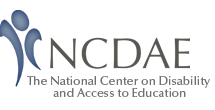NCDAE Webcast - Accessible Distance Education Technologies and Techniques
Overview
The following archive is from a Webcast held Wednesday, June 22nd, 2005 titled "Accessible Distance Education Technologies and Techniques." The broadcast featured Bob Regan of Macromedia, Soyini Cisse of Blackboard Inc., and Kristine Neuber from the Kellar Institute for Human Disabilities at George Mason University. The panel discussed accessibility of various distance education technologies (such as Macromedia's Breeze, Polycom, and the Blackboard educational system) used in secondary and post secondary education to deliver curriculum to students. The focus of the discussion was on the on the accessibility/usability of the technologies as well as techniques and best practices for creating accessible curriculum for distance education.
Archives
The archives for the audio broadcast from Wed, October 26, 2004, entitled Research and Development of Accessible Technologies are available below.
Panelists
Bob Regan - Director of Product Management for Education, Government, and Financial Services, Macromedia, Inc.
As a director Bob Regan serves as the customer advocate within product organization representing designers, developers and end users in each market. It is his responsibility to connect with the specific needs, challenges and successes of customers working to create digital content and applications. Bob has been very successful at sharing these experiences with the product teams and shaping Macromedia tools to ensure they are a great experience for all.
Bob Regan joined Macromedia in 2001 as the product manager for accessibility to launch Macromedia's accessibility effort. Since then, Bob has pioneered techniques in accessible rich media. He has helped write standards used by the W3C, The UK Office of e-Government and the Japanese Industrial Standards Committee. He has worked with companies like HP, Cisco, SAP, IBM, Motown, and Fujitsu to understand how to develop and support accessible rich media. In the years since that time, Bob has hired a team of individuals that carry the responsibility of accessibility for the company and its technologies. Together, they represent one of the best teams in the industry.
Recently, Bob has taken on a larger role at Macromedia to shape the product strategy and represent customers in the product development process. Bob works as part of a cross product development team that services all of the engineering efforts within the company. Bob collects customer feedback, identifies important standards and infrastructure that customers work with and shares that information to ensure the products reflect the needs of the customers. At the same time, Bob leads up projects after products have shipped to enhance the customer experience. He has led numerous efforts to integrate Macromedia tools with third party products that play important roles in customers' lives and created visionary demonstrations that illustrate new techniques and concepts.
Regan has a Masters degree from Columbia University in Education. He is a contributing author to several books including, "Constructing Accessible Web Sites", "The Flash Usability Guide", "Dynamic Dreamweaver MX", and "The Webmasters Handbook". Regan also writes a blog that is available at www.macromedia.com/go/bobregan .
Regan spent six years as a teacher and technology leader in Chicago and New York City . Working with teachers and students across a range of ages and subject matter, he has extensive knowledge of elementary and secondary education. Regan spent two years teaching web design and accessibility at the University of Wisconsin , Madison .
Bob Regan Speaking History
|
|
Soyini Cisse - Blackboard, Inc.
Soyini works with the engineering services department at Blackboard as the accessibility leader and coordinator for Blackboard, Inc.
Kristine Neuber - Kellar Institute for Human Disabilities - George Mason University
Kristine Neuber received her master's degree in Assistive/Special Education Technology from George Mason University in 1997. She is currently the Assistive Technology and Web Accessibility Coordinator for the Kellar Institute for Human disAbilities at George Mason University. Kristine is responsible for providing assistive technology screenings, trainings and support for all University students and employees with disabilities. In addition, she is coordinating the University's plan for Institutional Reform in the area of Web Accessibility. Kristine is also pursuing a doctorate in Special Education with an emphasis on disability policy.
The discussion was moderated by Jared Smith of the National Center on Disability and Access to Education.

